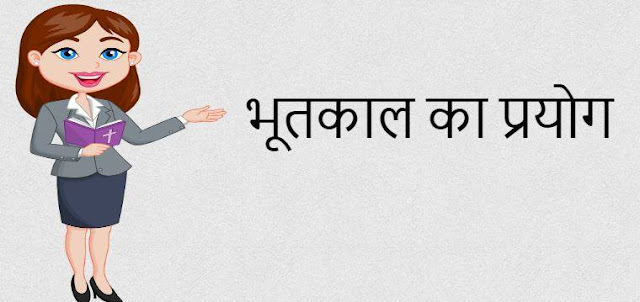भूतकाल का प्रयोग – Use of Past IndefiniteTense

भूतकाल का प्रयोग – Use of Past IndefiniteTense
Example – उसने मैच खेला – He play the match .
तुम कल यहाँ आये – You came hear yesterday .
Example – सीता ने गाना नहीं गाया -Seeta did not sing the song.
Example हमने अपना काम समाप्त नहीं किया – We did not finish our work.
Interrogative Tense (प्रश्नवाचक वाक्य ) – Interrogative Tense में अगर वाक्य में सबसे पहले क्या,कब,क्यों कैसे आया होतो सबसे पहले did not तथा verb (क्रिया ) की I form का प्रयोग किया जाता हैअंत में प्रश्नवाचक चिन्ह ( Question mark ) लगाना कभी नही भूलें
Example – क्या राहुल बाजार गया – Did Rahul go to market .
The Past Indefinite Tense, also known as the Simple Past Tense, is used to talk about actions that were completed at a specific point in the past. It is one of the most common tenses in English, and it’s simple to use because it only requires the verb in its past form.
Structure of Past Indefinite Tense:
-
Affirmative Sentences:
-
Subject + Verb (in the past form) + Object.
-
Example: She visited the museum yesterday.
-
-
Negative Sentences:
-
Subject + did not (didn’t) + Verb (base form) + Object.
-
Example: He didn’t go to the party last night.
-
-
Interrogative Sentences:
-
Did + Subject + Verb (base form) + Object?
-
Example: Did you watch the movie last weekend?
-
Uses of the Past Indefinite Tense:
-
To Express Actions Completed at a Specific Time in the Past:
-
The action is finished, and it happened at a definite time in the past.
-
Example: I graduated in 2015.
-
Example: They traveled to Paris last summer.
-
-
For Series of Past Actions:
-
When multiple actions happened in sequence in the past.
-
Example: She woke up, brushed her teeth, and left for work.
-
-
To Talk About Past Habits or Routines (especially with “used to”):
-
Example: He played football every Sunday when he was a child.
-
Example: I visited my grandmother every summer when I was younger.
-
-
For General Statements or Facts About the Past:
-
Example: The Earth revolved around the sun.
-
Example: The king ruled over the land for 20 years.
-
-
To Show Past Events Without Specifying the Exact Time (when it’s understood or implied):
-
Example: I saw that movie last week. (The time is not specified but it’s understood to be a recent event.)
-
Example: She finished her homework yesterday.
-
Examples of Sentences in the Past Indefinite Tense:
-
Affirmative Sentences:
-
I visited London last summer.
-
She studied hard for the exam.
-
They watched the game on TV.
-
-
Negative Sentences:
-
I didn’t like the book.
-
He didn’t attend the meeting yesterday.
-
We didn’t travel last year.
-
-
Interrogative Sentences:
-
Did you go to the concert last night?
-
Did she call you yesterday?
-
Did they enjoy the movie?
-
Signal Words for Past Indefinite Tense:
-
Yesterday, last (week, year, month, etc.), ago, in (2010, January, etc.), once, then, when, after, before.
Examples of Signal Word Use:
-
Yesterday: I met him yesterday.
-
Last week: They visited their grandparents last week.
-
Two days ago: We saw a play two days ago.
Note on Verb Forms in Past Indefinite Tense:
-
Regular verbs: The past tense is formed by adding “-ed” to the base verb.
-
Example: play → played, watch → watched, call → called
-
-
Irregular verbs: The past tense form changes in an irregular way and does not follow a specific pattern.
-
Example: go → went, have → had, eat → ate, buy → bought
-
Conclusion:
The Past Indefinite Tense is useful for talking about actions or events that have already been completed at a definite time in the past. It’s often used in storytelling, discussing past experiences, or describing routines from a previous time.
Let me know if you want more examples or need help with understanding specific usages!
